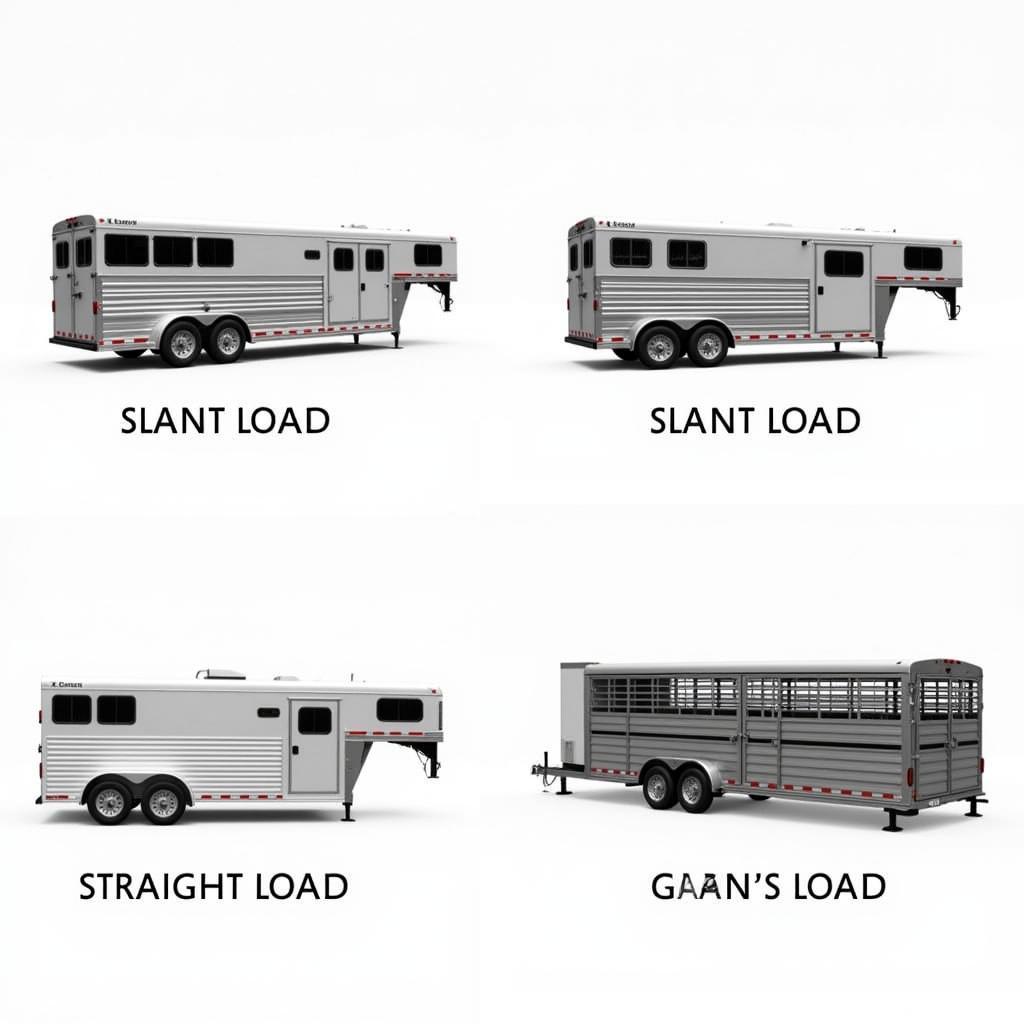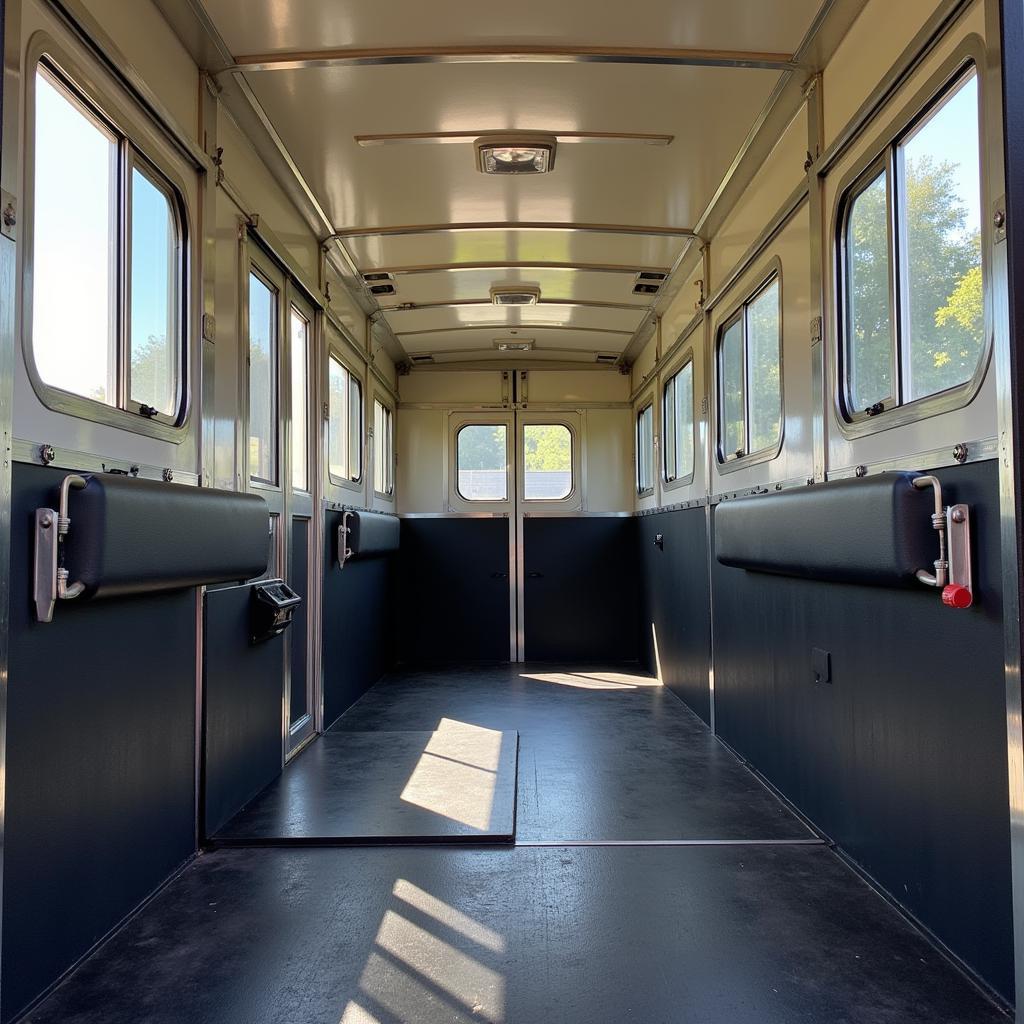Santiago’s dream of owning a 4-horse trailer is shared by many equestrian enthusiasts. Transporting your horses safely and comfortably is crucial, whether you’re heading to competitions, trail rides, or veterinary appointments. Choosing the right trailer involves careful consideration of your horses’ needs, your budget, and your vehicle’s towing capacity.
 Different Types of 4-Horse Trailers
Different Types of 4-Horse Trailers
Factors to Consider When Choosing a 4-Horse Trailer
Before you start shopping for a 4-horse trailer, there are several essential factors to consider:
1. Horse Size and Number: Measure your horses’ height and width to ensure they’ll fit comfortably. Consider future needs if you plan to transport more horses or purchase larger breeds.
2. Trailer Weight and Towing Capacity: Determine your vehicle’s towing capacity, remembering to factor in the trailer’s weight and the weight of the horses and any additional cargo.
3. Budget: 4-horse trailers come in a wide price range. Establish a realistic budget and explore financing options if needed.
4. Trailer Features: Consider features like slant load vs. straight load, living quarters, escape doors, ventilation, and interior padding.
5. New vs. Used: Both new and used trailers have pros and cons. New trailers offer warranties and the latest features, while used trailers can be more budget-friendly.
Types of 4-Horse Trailers
There are several types of 4-horse trailers, each with its advantages:
– Slant Load Trailers: Horses stand at an angle, maximizing space and often providing a smoother ride.
– Straight Load Trailers: Horses stand straight in, offering more headroom and easier loading for some horses.
– Stock Trailers: Versatile trailers with open tops, often used for hauling livestock but can be adapted for horses.
 Spacious and Well-Ventilated 4-Horse Trailer Interior
Spacious and Well-Ventilated 4-Horse Trailer Interior
Essential Safety Features
– Brakes: Ensure the trailer has a reliable braking system, ideally electric brakes for optimal control.
– Flooring: Durable, non-slip flooring is crucial for horse safety, with rubber mats providing additional cushioning.
– Ventilation: Adequate ventilation is essential to prevent overheating and respiratory issues, especially during warmer months.
– Lighting: Working interior and exterior lights are essential for visibility and safety during transport.
Tips for Safe Trailering
– Practice Loading and Unloading: Familiarize your horses with the trailer gradually, using positive reinforcement techniques.
– Securely Hitch the Trailer: Double-check the hitch connection and safety chains for a secure and level tow.
– Distribute Weight Evenly: Load horses and cargo evenly to prevent sway and ensure a balanced ride.
– Drive Defensively: Be mindful of the trailer’s length and weight, allowing for longer stopping distances.
Maintenance and Care
Regular maintenance is key to extending the lifespan of your 4-horse trailer:
– Cleanliness: Regularly clean the interior and exterior, removing manure and debris.
– Tire Care: Check tire pressure regularly and inspect for wear and tear.
– Rust Prevention: Address any rust promptly to prevent further damage.
– Inspections: Schedule periodic professional inspections to identify potential issues early on.
 4-Horse Trailer Safely Towing Horses on a Scenic Road
4-Horse Trailer Safely Towing Horses on a Scenic Road
Conclusion
Investing in a 4-horse trailer is a significant decision for any horse owner. By carefully considering the factors outlined above and prioritizing safety and comfort, Santiago can find the perfect trailer to transport his equine companions with confidence. Remember, a well-chosen 4-horse trailer is an investment in your horses’ well-being and your peace of mind.